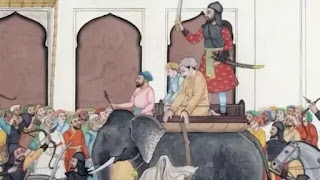WHO WAS AURANGZEB?
Muhi-ud-Din Muhammad Aurangzeb Alamgir, popularly known as Aurangzeb, was the sixth Mughal Emperor, who ruled over almost the entire subcontinent of India for a period of 49 years. He was considered the last effective ruler of the Mughal Empire before British colonialism.
WHAT OPINIONS DO PEOPLE HAVE ABOUT HIM?
According to many, he destroyed India politically, socially, and culturally. Aurangzeb's list of alleged crimes is long and grave. He was charged with fighting protracted, pointless wars in central and southern India. He is envisioned as a cruel despot who brutally murdered enemies.
Whereas, in the Pakistani narrative, Aurangzeb is presented as a hero who fought and expanded the frontiers of the Islamic Empire. He is depicted as a pious Muslim who reintroduced Islamic laws by banning music.
WHAT KIND OF JUSTICE DID AURANGZEB DO?
During the reign of Aurangzeb, in the village of Banaras lived a Pandith with his daughter, Shakuntala. One day a Muslim Commander spotted Shakuntala and loved her beauty due to which he demanded the Pandith to get his daughter dressed and sent to his palace in seven days. Upon this, the Pandith was very confused but couldn't refuse the commander. He later told his daughter about the incident, after giving it a thought Shakuntala asked her father to request the commander for a month to organize some money for the arrangements required. The commander agreed but asked the girl to be sent after a month without fail. Shakuntala wore a Muslim man's attire and left for Delhi, she arrived on Friday, and usually on Fridays people would write down their problems on a paper and hand it over to Aurangzeb as he left the mosque after prayers. Aurangzeb would take the notes and after a couple of days announce the judgment.
Shakuntala did the same while disguising herself as a man, but when taking the note from her Aurangzeb put a cloth around his hand, and on being questioned Aurangzeb replied saying that it is haram(forbidden) to touch other women in Islam and that he knew she was actually a woman. Shakuntala stayed with Aurangzeb for a few days and explained her worries, in return he asked her to go back as she had to be at the Muslim commanders' palace on time. After reaching home Shakuntala was disheartened but had a spark of hope that Aurangzeb would definitely help her.
The day finally arrived and as Shakuntala made her way through the crowd, the commander was throwing out money to beggars to celebrate his happiness during which a beggar who had his identity covered asked the commander to hand the money over into his hand, after doing so the man revealed his identity which left the commander astonished and it was non-other than Aurangzeb. He stated that the commander trying to use the daughter of a Pandith would bring disgrace upon the Muslims and so Aurangzeb ordered the commander's hands and legs to be tied to four elephants and make all of them go in different directions and tear the commander apart.
Aurangzeb later offered salaah(prayers) near the Pandits house and thanked Allah(SWT) for choosing him to save a non-Muslim girl. He then asked Shakuntala to get him a glass of water, after drinking, he said that from the day he learned of her problem he promised himself that until he would get her justice he wouldn't drink water. After he left for Delhi, the Pandit and other villagers decided to build a mosque on the spot where Aurangzeb offered Salaah, the justice Aurangzeb had done was written on a golden plate and to this day is present in the mosque. This is Aurangzeb's justice!




11 comments:
Excellent work.keep it up.
Wow - Truth can be suppressed - but - can never be hidden - This is the Moral of your Blog - Keep on doing the good work - We Love you �� - !
MashaAllah. Beautiful article. Thanks for sharing. May ALLAH bless you.
Your father's friend
Thank you Very much!
Indeed, I appreciate it.
Thanks a lot. Ameen!
"Jo tumhe "der" lag rahi hai. Asal mein wo "khair" hai". Maybe you got my point. Zubia.
Mashallah very good. We're Proud of you. Sabse behtar. TAWAAF wala blog. Excellent. Keep going.
Yes I understood, Jazak'Allah Khair, it means alot!
Many more to come, stay tuned.
MashaAllah great work to bring reality on this platform. Well done and keep it up
MashaAllah excellent work👍
Any source for this story?
Post a Comment